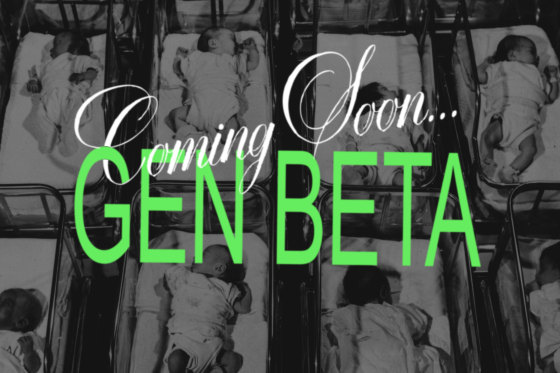If you just found out about Generation Alpha, brace yourself for a new crop of kids set to debut on Jan. 1.
Generation Beta will start arriving in 2025 — and some experts predict they will be immersed in artificial intelligence and technology even more than the generations before them.
Start and end dates of generations can be murky, but Generation Beta will keep being born until around 2039. Before them, Gen Alpha stretched from 2010 to 2024, Gen Z from around 1996 to 2010, and millennials from 1981 to 1996.
The upcoming generation “will inherit a world grappling with major societal challenges,” wrote demographer and futurist Mark McCrindle in a blog post. “With climate change, global population shifts, and rapid urbanisation at the forefront, sustainability will not just be a preference but an expectation.”
If you’re getting whiplash, you’re not alone.
“It wasn’t that long ago that we were talking about millennials as kids,” said Jason Dorsey, a generational researcher and the author of “Zconomy: How Gen Z Will Change the Future of Business — and What to Do About It.”
Dorsey says Generation Beta will be starting their lives much differently than their Gen Alpha counterparts. The children of younger millennials and older Gen Zers, they will be born into a completely post-pandemic world. Many of them will live to see the 22nd century.
Much like the youngest of Gen Alpha, they may not experience the school shutdowns and social isolation of Covid, but their families and their siblings will have been irrevocably shaped by it.
“It’ll be something that maybe older siblings went through, certainly something they learn about in history, but not something that is necessarily a contemporary event,” he said.
Generation Beta will probably be entrenched in smart devices and artificial intelligence in a way that previous generations haven’t been, according to Dorsey. Like Gen Alpha, they will rely on them to solve problems.
They will also likely grow up with climate change as a dire reality with more direct consequences on their lives. As they mature, they will see Gen X and boomer leaders dealing with these problems slowly replaced by millennials and Gen Z.
“We will likely have Gen Z as elected officials when Gen Beta is old enough to vote,” Dorsey said. “Climate change will continue to be a really big deal for them.”
Gen Alpha’s chronically online reputation
Just like Gen Z and Gen Alpha, Gen Beta will grow up with social media, though it’s still unknown how those mediums will evolve in the next decade-plus. But other experts predict that Gen Z parents might choose to shield their kids from being chronically online, a stereotype that has come to define Gen Alpha.
While older millennial parents tend to integrate technology into their Gen Alpha kids’ lives, McCrindle wrote that Gen Z parents might take a different approach with their future Gen Beta children.
“Generation Z know more about both the positives and challenges that come with social media use from a young age,” McCrindle wrote. “As the most technologically savvy generation of parents, Gen Z see the benefits of technology and screen time, but equally they see the downsides of it and are pushing back on technology and the age at which their children access and engage with it.”
In the last couple of years, Gen Alpha has developed a reputation of being “iPad kids,” consuming nonsensical content on social media and popularizing a lexicon of confusing phrases like “skibidi toilet” and “what the sigma.”
“It’s meant to create this in-group which alienates older people,” content creator and linguist Adam Aleksic told NBC News in August. “And it can be hard for older people to catch up, because you’ve got to be very current with the fads. It evolves so quickly online.”
Are generational labels useful?
With how fast the world seems to be evolving, categorizing a 15-year age range under one label is becoming a challenge, Dorsey said.
He sees the value in generational names when it comes to identifying a group of people all affected by a standout moment in time, Dorsey said. For millennials, that defining event was 9/11, he said, and for Gen Z, the pandemic. It’s too early to predict what those will be for Gen Alpha and Gen Beta, he said.
“These are clues to help us get context for what a group of people likely or may have experienced as they came of age,” he said.
But there are drawbacks to generational labels, some researchers have noted.
The Pew Research Center said in 2023 that it would mostly stop using generational labels in its research, writing in part that demographic differences like race and class are bigger factors in dictating a group’s commonalities.
“By choosing not to use the standard generational labels when they’re not appropriate, we can avoid reinforcing harmful stereotypes or oversimplifying people’s complex lived experiences,” Pew researchers wrote.
Dorsey agrees, saying that we can look back at millennials and boomers, or look forward to Gen Alpha and Gen Beta, for overarching trends. But maintaining perspective is important.
“Generational labels are helpful as long as you understand their limitations,” he said. “We think they’re really helpful to get a head start, to create more of a shared understanding. … We’re all still individuals.”

